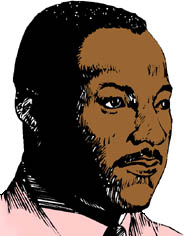Alternate Sources of Prejudice

 |
While most people believe that prejudice
stems from psychological sources, some other possible explanations
have been identified. Among these are biological sources, social sources,
and historic and cultural sources. Prejudices, stereotypes, and social-isms
all are "multidetermined", meaning they cannot be traced back to one
distinct cause. However, exploring all of the possible alternative
sources of prejudice can help one better understand why it exists
and maybe provide some answers as to what can be done to eliminate
prejudice and discrimination.
|

Biological Sources
Some scientists believe that prejudice can be
inborn. They believe that some people are just naturally more prejudiced than
others, regardless of how they were raised, educated, and interacted socially.
One documented theory is the Genetic Similarity Theory of sociobiologist Philippe
Rushton. This theory states that prejudice towards others is a result of evolution.
People are programmed to bias against others unlike themselves based on "survival
of the fittest". They want only their genes to be reproduced and passed on,
thus wanting them to suppress others who are not in the "in-group". This primarily
deals with racial and ethnic prejudices.
While the biological explanations of prejudice
formation are controversial, they are based in other accepted scientific theories,
such as evolution. Still, while they may seem to somewhat explain why prejudice
exists in some people and not in others, biology has not been proven to be a
good predictor of prejudicial behavior.
Social Sources
There are a few social explanations for the
existence of widespread prejudice. One of these is based in social norms. Social
norms are what the specific society either officially or unofficially agrees
is "normal" for everyone; they are often unspoken laws by which we all abide.
For example, a person wouldn't usually wear two totally different shoes or go
yelling through a library, it would be considered "weird" because it broke the
social norms we all live by. Prejudice works the same way.
Often whole societies can be prejudiced against
outsiders of any type. Being prejudice against, having dislike and/or distrust
for, and mistreating anyone seen as different might be a social norm; something
that a member of the society does just because it's what they're "supposed to
do".
Another social theory of prejudice formation is
called Realistic Conflict Theory. This theory is based on the idea that in some
cases, different groups are in competition for limited resources, such as food,
water, and money. They then band together, based on their ethnic heritage, to
take what they believe should be theirs. As of late this has shown itself in
the "ethnic cleansing" happening in Eastern Europe.
Historical and Cultural Sources
Some theorists choose to look at prejudice from
a historical perspective. For example, prejudice against blacks in the United
States has its historical roots in slavery and the Civil War. Often history
is the case in areas that new people have moved into an area, and the natives
have felt threatened or were downright suppressed. This includes such places
as South Africa, Northern Ireland, and the former Yugoslavia. Historical prejudice
can be the result of direct aggression, or just a cultural misunderstanding.
It is quite easy for a cultural misunderstanding to occur, when two very different
countries come in contact with one another, with differing languages, beliefs,
values, wants, and needs. These misunderstandings can snowball, and over time
create a rift huge enough to cause widespread prejudice to occur.
